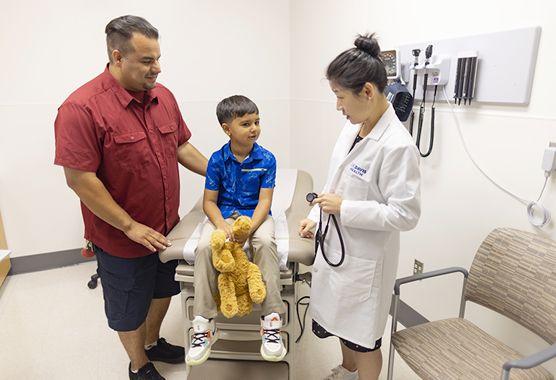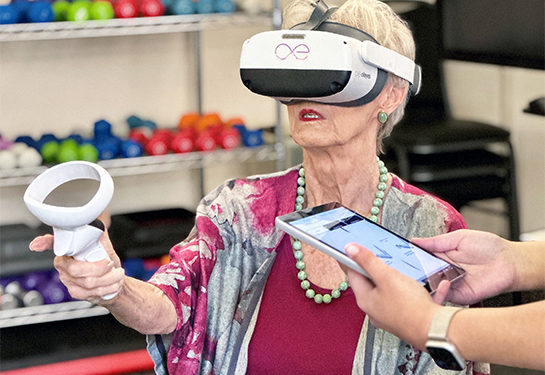Leukodystrophies
Leukodystrophies are rare genetic neurological conditions affecting the white matter of the central nervous system. Researchers are working to diagnose and identify these conditions early on. Our specialists can help you or your child manage symptoms and find clinical trials that are the best fit.
Medically reviewed by William Benko, M.D. on May 30, 2025.

Our Team-Based Care for Leukodystrophies
Our neurologists and other specialists in the UC Davis Leukodystrophy Clinic have expertise in diagnosing and treating leukodystrophies. We provide you or your loved one with comprehensive care and customize treatment to your needs.
Our team-based approach gives you access to a wide range of specialists. This includes those in neurology, pulmonology, endocrinology, physical medicine and rehabilitation, neuroradiology, neonatology, and more. Our social worker is ready and available to meet you at your visit when desired.
We are a member of the Hunter’s Hope Leukodystrophy Care Network (LCN) Program, which means we meet or exceed LCN’s standards for exceptional patient care. UC Davis Health became the 12th Children’s Hospital and is now one of 15 LCN Certified Centers nationwide. Meet our specialists ready to help you.
Leukodystrophy Symptoms
Leukodystrophies are rare, genetic conditions that affect the white matter in your brain and/or spinal cord. White matter is the protective membrane around the nerves in your brain and spine that allow for quick transmission of information. Genetic defects in the white matter can cause problems with your vision, hearing, speaking, movement and overall neurological development. They most often affect children but can also impact adults.
Symptoms of a leukodystrophy vary depending on the condition type you have. Most types cause a gradual loss of neurological function. This can affect your vision, hearing, speaking and movement.
Common Symptoms
Signs of leukodystrophy may include:
- Developmental regression
- Loss of muscle strength, with later increases in loss of muscle tone
- Balance issues if the cerebellum is involved
- Difficulty walking
- Speech problems
- Vision issues
- Problems with eating and swallowing
- Difficulty hearing
- Bladder issues
- Learning disabilities
- Trouble breathing
- Developmental delays
- Muscle control disorders
- Seizures
Causes of Leukodystrophies
Leukodystrophies are usually the result of gene mutations passed down from your parents. Sometimes, however, these mutations occur randomly.
ABCD1 Pathogenic Gene Variants
These cause X-linked Adrenoleukodystrophy, Adrenomyeloneuropathy (AMN) which affects boys most commonly (Cerebral ALD), followed by adult males (AMN) and women with (non-Cerebral) ALD.
ARSA or PSAP Gene Mutations
These cause metachromatic leukodystrophy, which can impact children and adults. Gene therapy can prevent or slow progression when given in the very early stages of the disease presentation.
GALC Gene Mutations
These cause Krabbe disease, which most often affects infants. However, it can also impact adolescents and adults.
GFAP Gene Mutations
These cause Alexander disease, which usually shows up in infancy or early childhood.
PLP1 Gene Mutations
These cause Pelizaeus-Merzbacher disease, which usually affects male children and adults.
Diagnosing Leukodystrophies
We ask about the symptoms you have and perform a physical and neurological exam to diagnose a leukodystrophy. We also take your medical history, including your family history.
If we think you may have a leukodystrophy, we may order tests, such as:
- Imaging tests, like an MRI, are used to look at the white matter in your brain and spinal cord.
- Genetic tests to check for pathogenic gene variants (formally referred to as mutations).
Treatments for Leukodystrophies
Most leukodystrophies cannot be cured. However, we can help you manage the symptoms with treatments such as:
Medication
Your doctor may prescribe medicines to manage seizures, muscle tone and stiffness, and movement problems.
Therapy
Our compassionate physical, occupational and speech therapists can help improve issues including mobility, balance and speaking ability.
Stem Cell or Bone Marrow Transplantation
For a few types of leukodystrophy, a stem cell or bone marrow transplant can be helpful. Gene Therapy for two types of leukodystrophies are currently FDA approved while clinical trials are ongoing using ASO (AntiSense Oligonucleotide therapy). Research is ongoing in this area.
Request an Appointment
As Sacramento's No. 1 hospital, you'll benefit from unique advantages in primary care and specialty care. This includes prevention, diagnosis and treatment options from experts in 150 specialties.
Referring Physicians
To refer a patient, submit an electronic referral form or call.
800-4-UCDAVIS
Patients
Call to make an appointment.
Consumer Resource Center
800-2-UCDAVIS

Ranked among the nation’s best hospitals
A U.S. News & World Report best hospital in cardiology, heart & vascular surgery, diabetes & endocrinology, ENT, geriatrics, neurology & neurosurgery, and pulmonology & lung surgery.

Ranked among the nation’s best children’s hospitals
U.S. News & World Report ranked UC Davis Children’s Hospital among the best in pediatric nephrology, orthopedics*, and pulmonology & lung surgery. (*Together with Shriners Children’s Northern California)

Ranked Sacramento’s #1 hospital
Ranked Sacramento’s #1 hospital by U.S. News, and high-performing in aortic valve surgery, back surgery (spinal fusion), COPD, colon cancer surgery, diabetes, gynecological cancer surgery, heart arrhythmia, heart failure, kidney failure, leukemia, lymphoma & myeloma, lung cancer surgery, pacemaker implantation, pneumonia, prostate cancer surgery, stroke, TAVR, cancer, orthopedics, gastroenterology & GI surgery, and urology.

The nation’s highest nursing honor
UC Davis Medical Center has received Magnet® recognition, the nation’s highest honor for nursing excellence.

World-class cancer care
One of ~59 U.S. cancer centers designated “comprehensive” by the National Cancer Institute.

A leader in health care equality
For the 13th consecutive year, UC Davis Medical Center has been recognized as an LGBTQ+ Healthcare Equality Leader by the educational arm of America’s largest civil rights organization.

